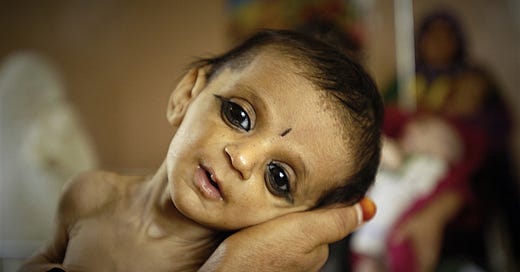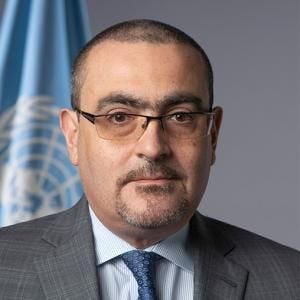HUNGER CATASTROPHE IN AFGHANISTAN
U.S. stole $9.4 billion of Afghan central bank reserves 7 months ago
March 29 (EIRNS)—Dr Ramiz Alakbarov, Deputy Special Representative for the UN Secretary General, reported on March 15 that people in Afghanistan are today facing a food insecurity and malnutrition crisis of “unparalleled proportions”.
Warnings made last September and October by World Food Program Executive Director David Beasley and Under-Secretary General for Humanitarian Affairs Martin Griffiths, on what the consequences would be were sufficient funding and humanitarian aid to the country not forthcoming, have become reality.
Alakbarov pointed to the rapid increase of those experiencing acute hunger, a figure that rose from 14 million in July of 2021 to 23 million last month, and which has forced families to resort to skipping meals or taking on huge debt in order to buy food.
Resorting to these desperate measures has caused “untold suffering,” the UN official said, including “high levels of wasting in children and other harmful impacts on the physical and mental wellbeing of women, men and children.” As an example, Human Rights Watch reported that just since January of this year, 13,000 newborns have died.
[Confirmed here]
Today, 95% of the population does not consume enough food, and for female-headed households the figure is 100%. Under-funded and under-equipped hospitals are filled with children suffering from malnutrition. There are acute malnutrition rates in 28 out of 34 provinces and 3.5 million children in need of nutritional support and treatment.
In agriculture, the effects of a severe drought remain, and this year’s harvest is expected to be bad. Combine this with the severe banking and financial crisis, abetted by the U.S.’s seizure of $9.4 billion in Afghanistan’s central bank reserves, which has forced 80% of the population to take on debt to survive; food and fuel prices are soaring. Alakbarov warns that now, for the first time, rampant unemployment and a liquidity crisis are putting all major urban centres in danger of slipping into the Phase 4 emergency level of food insecurity, including former middle-class populations.
—0—
The dire situation in Afghanistan was reported here in May 2019 and UNICEF were unable to provide sufficient funds at that time.
“While the crisis isn’t new, malnutrition has become worse in Afghanistan due to a series of devastating droughts, Alison Parker, UNICEF’s Chief of Communication, Advocacy & Civic Engagement in Afghanistan, told RT.
“Nutrition is not just an issue of food,” Parker noted, listing safe water, sanitation and especially poverty as driving factors behind the crisis. “The government recognizes that it needs a cohesive response,” Parker noted. However, funds to combat the malnutrition epidemic are drying up. UNICEF says that it needs an additional $7 million to provide aid to the growing number of malnourished children.”
More on the U.S. seizure/theft of Afghan reserves in a video:
https://www.democracynow.org/2022/2/15/afghanistan_assets_joe_biden_executive_order






The US GOVERNMENT, not the "US." Most of the people here have no idea what the hell is going on, even in our own country. We are a population distracted by media, consumerism, and all the BS being ladled out now that is deliberate distraction... We used to be the healthiest people in the world; now, among the "Western" nations, we're the sickest. The dumbed-downest, the most narcissistic, uneducated, foolish... We'll lose a LOT of our population to the Jab, and the rest of us will be seriously depleted by starving us. Similar plans for Europe. The problem with fighting back when you're starving is that you don't have the strength to do it...
UPDATE:
Afghanistan Is Moving Forward, Lavrov Tells Friends of Afghanistan Meeting
March 31 (EIRNS)—The Foreign Ministers Meeting of the Friends of Afghanistan hosted by China in Tunxi, was “extremely important,” sending as it did the message to the international community that it must become much more active in helping Afghanistan, first with its humanitarian needs, but then with the revival of its economy, Russian Foreign Minister Sergey Lavrov told Xinhua after the meeting concluded.
Before, in his address to its plenary meeting today, Lavrov expressed some optimism about Afghanistan’s acting government, which, he said, “despite the lack of governance experience, financial and economic restrictions and political and diplomatic pressure from the United States and its allies ... has managed to keep the state afloat.” The government has scored some positive results in counterterrorism, is “exerting efforts in order to comply with human rights,” and “working proactively to expand its diplomatic and economic ties.” Trade and other economic activities, primarily with its regional neighbors, are gradually increasing, and Taliban officials are meeting with foreign partners in multiple bilateral and multilateral formats.
“These promote the international recognition of the new Afghan authorities,” Lavrov remarked, reporting that the first Afghan diplomat representing the Taliban government in Moscow has been accredited at the Russian Foreign Ministry. This does not represent official recognition of the government, he cautioned, as the Taliban government “does not fully represent all sections of Afghan society, and we see this as the main obstacle.” Should that condition be met, the UN should lead the way in officially recognizing the Taliban movement, he said.
But Lavrov also warned that the situation remains unstable, with international terrorist groups and the Panjshir resistance guerrillas still major factors of tension in the country—and a threat to the region. So, too, drug trafficking has not abated, and cultivation and production of illegal drugs increased last year. High-ranking Taliban officials are sounding the alarm over an increase in drug addiction to 5 million people, including 1 million women and children, Lavrov said, but Taliban officials “have not prohibited farmers from planting opium poppy in light of the difficult economic situation.”
Here, Lavrov put the onus on the international community, which must “aid Afghanistan’s transition to alternative crops.” Comprehensive measures, combining law enforcement with improvement of agriculture and healthcare, are required to deal with the drug problem.